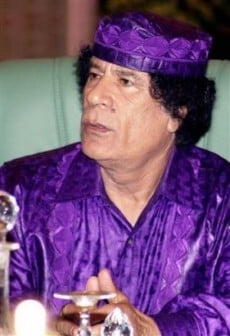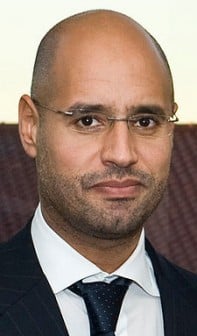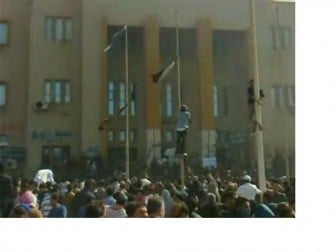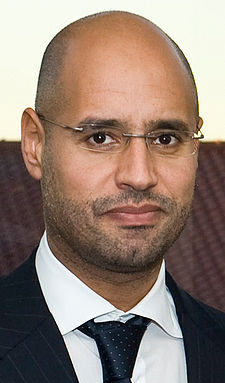TRIPOLI, (Reuters) – Libyan strongman Muammar Gaddafi will fight a popular revolt to “the last man standing,” one of his sons said today as people in the capital joined protests for the first time after days of violent unrest in the eastern city of Benghazi.
Anti-government protesters rallied in Tripoli’s streets, tribal leaders spoke out against Gaddafi, and army units defected to the opposition as oil exporter Libya endured one of the bloodiest revolts to convulse the Arab world.

Gaddafi’s son Saif al-Islam Gaddafi appeared on national television in an attempt to both threaten and calm people, saying the army would enforce security at any price.
“Our spirits are high and the leader Muammar Gaddafi is leading the battle in Tripoli, and we are behind him as is the Libyan army,” he said.
“We will keep fighting until the last man standing, even to the last woman standing…We will not leave Libya to the Italians or the Turks.”
Wagging a finger at the camera, he blamed Libyan exiles for fomenting the violence. But he also promised dialogue on reforms and wage rises.
The cajoling may not be enough to douse the anger unleashed after four decades of rule by Gaddafi — mirroring events in Egypt where a popular revolt overthrew the seemingly impregnable President Hosni Mubarak 10 days ago.
In the coastal city of Benghazi protesters appeared to be largely in control after forcing troops and police to retreat to a compound. Government buildings were set ablaze and ransacked.
In the first sign of serious unrest in the capital, thousands of protesters clashed with Gaddafi supporters. Gunfire rang out in the night and police used tear gas to disperse demonstrators, some of whom threw stones at Gaddafi billboards.

Human Rights Watch said at least 223 people have been killed in five days of violence. Most were in Benghazi, cradle of the uprising and a region where Gaddafi’s grip has always been weaker than elsewhere in the oil-rich desert nation.
Habib al-Obaidi, a surgeon at the Al-Jalae hospital, said the bodies of 50 people, mostly shot dead, were brought there yesterday afternoon. Two hundred wounded had arrived, he said.
“One of the victims was obliterated after being hit by an RPG (rocket propelled grenade) to the abdomen,” he said.
Members of an army unit known as the “Thunderbolt” squad had brought wounded comrades to the hospital, he said. The soldiers said they had defected to the cause of the protesters and had fought and defeated Gaddafi’s elite guards.
“They are now saying that they have overpowered the Praetorian Guard and that they have joined the people’s revolt,” another man at the hospital, lawyer Mohamed al-Mana, told Reuters by telephone.
BENGHAZI THE CRADLE
If Gaddafi had hoped to dismiss Benghazi as a provincial problem, he faced an alarming development last night as crowds took to the streets of Tripoli.
One resident told Reuters he could hear gunshots in the streets and crowds of people.
“We’re inside the house and the lights are out. That’s what I hear, gunshots and people. I can’t go outside,” he said.
An expatriate worker said anti-government demonstrators were gathering in residential complexes.
“The police are dispersing them. I can also see burning cars,” he said.
Support for Gaddafi, the son of a herdsman who seized power in 1969, among Libya’s desert tribes was also waning.
The leader of the eastern Al-Zuwayya tribe threatened to cut oil exports unless authorities halted what he called the “oppression of protesters”.
Speaking to Al Jazeera television, Shaikh Faraj al Zuway said: “We will stop oil exports to Western countries within 24 hours” if the violence did not stop.

Akram Al-Warfalli, a leading figure in the Al Warfalla tribe, told Al Jazeera: “We tell the brother (Gaddafi), well he’s no longer a brother, we tell him to leave the country.”
The Libyan uprising is one of series of revolts that have raced like wildfire across the Arab world since December, toppling the long-time rulers of Tunisia and Egypt and threatening entrenched dynasties from Bahrain to Yemen.
The West has watched with alarm as long-time allies and old foes have come under threat, appealing for reform and urging restraint.
REVILED AND REVERED
Gaddafi has been one of the most recognizable figures on the world stage in recent history, reviled by the West for many years as a supporter of militants and revolutionary movements while at the same time cutting a showmanlike figure with his flowing robes, lofty pronouncements and bevy of glamorous female assistants attending him in his Bedouin tent.
Former U.S. President Ronald Reagan once called him “the Mad Dog of the Middle East” and in 1986 unleashed air raids against Tripoli in response to the bombing of a Berlin disco frequented by U.S. servicemen, an attack Washington blamed on Libya.
The 1988 destruction of a Pan Am airliner over Lockerbie, Scotland, by Libyan agents in which 270 people were killed brought him fresh notoriety and led to U.N. sanctions.
But recent years have seen a rapprochement with the West as countries such as Britain and Italy sought a slice of its oil wealth and other lucrative commercial deals.
Though portrayed overseas as a ruthless despot, Gaddafi has enjoyed some popular support at home. After toppling King Idriss in 1969, he forged a middle road between communism and capitalism and oversaw rapid development of the poor country.
While using ruthless tactics against dissidents, he also spent billions of oil dollars to improve living standards.

